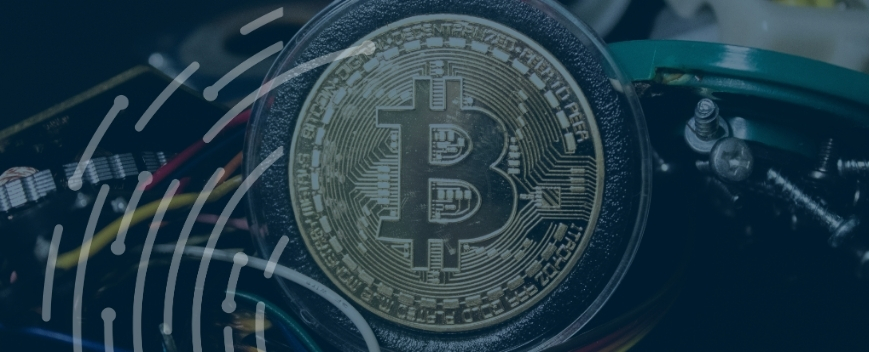An introduction to Bitcoin | Trade Finance Global

Contents
What Is Bitcoin?
Bitcoin was the world’s first ‘cryptocurrency’ – a distributed, decentralised, digital currency that enables users to transact directly with each other without intermediaries.
Since its inception, Bitcoin has experienced massive price swings, climbing to a record market cap of $1.28 trillion in November 2021 but also experiencing countless single-day double-digit price drops
The bitcoin token can now be used for all kinds of purchases, ranging from pizzas to flights.
Although Bitcoin has faced heavy criticism for its volatility and uses in dark net transactions, its promise is undeniable.
Aside from the obvious financial applications of Bitcoin, the blockchain technology that it’s built on has already begun to revolutionise all sorts of businesses – from healthcare to trade finance.
Many critics speculate that Bitcoin is a passing trend that is nearing its end. On the contrary, Bitcoin – and the wider crypto-verse as a whole – looks set to be a core part of the future of several key industries.
To learn a little bit more about Bitcoin let’s take a look back at a timeline of the first 10 years of its existence.
History of Bitcoin – the first 10 years
Bitcoin was conceptualised in the wake of the 2008 financial crisis in the form of a whitepaper by a pseudonymous individual (or group) known as ‘Satoshi Nakamoto’.
Nakamoto’s identity has never been confirmed although speculators and enthusiasts have purported several suspects over the years.
Although Satoshi Nakamoto was the first person to successfully create a viable cryptocurrency, he wasn’t the first to try.
Others had attempted to create online currencies, but none had succeeded. One example is ‘bit gold’, a precursor to Bitcoin which was formulated in 1998 by Nick Szabo. There have been many notable developments in Bitcoin over time.
Below is a short timeline which outlines the main highlights.
2009:
Bitcoin is made public and the process of ‘mining’ begins.
2010:
The first ever Bitcoin trade occurs over a Bitcoin forum. Up until this point, Bitcoins had only been mined.
2011:
Bitcoin reaches parity with the dollar (US) in February and then quickly exceeds it. By June, 1 Bitcoin is worth $31. The first market competitors to Bitcoin – known collectively as ‘altcoins’ – begin to appear.
2013:
The price of one Bitcoin has reached $1000. At this point, it begins to decline and plummets to approximately $300. The People’s Bank of China bans financial institutions in China from handling Bitcoin transactions.
2014:
The US government seizes 29,000 Bitcoins from Silk Road, an online drug marketplace, and subsequently auctions them off. Microsoft begins to accept payments in Bitcoin.
2015 – 2016:
The value of one Bitcoin climbs back up to $770 by June 2016. Ethereum, one of Bitcoin’s most successful successors and the second-largest cryptocurrency by market capitalisation, is released.
2017:
The price of Bitcoin spikes as demand soars and climbs from less than $1000 to almost $20,000 by the end of the year.
2018:
Prices tanked after January, falling by over 50% by April. It’s been speculated that this fall was due to the launch of a Bitcoin futures market.
2019:
The dawn of 2019 found Bitcoin trading below the $4000 mark after a difficult year for the global crypto market.
2020:
Bitcoin’s price reached just under $29,000 in December 2020, increasing 416% from the start of that year.
2021:
By mid-April, Bitcoin prices reached new all-time highs of over $60,000.
2022:
On 18 June, Bitcoin dropped below $18,000, to trade at levels beneath its 2017 highs.
2023:
By December 13, 2023 Bitcoin price reached $41,450.
2024:
In December 2024, bitcoin price reached $100,000 for the first time.

Bitcoin Uses
Bitcoin has many practical uses, including:
- As an investment vehicle
- To make purchases with greater anonymity
- To transfer money internationally without incurring expensive fees
- To purchase online goods with low transaction cost
Whilst some retailers now accept payment in Bitcoin, a large number still don’t. Therefore, at present, the use of Bitcoin is largely constrained by the limited number of purchasing options.
The number of retailers that accept Bitcoin is growing and this may change in the future.
Uses within trade finance
In addition to the general uses above, Bitcoin – or rather, the blockchain technology used in Bitcoin – is potentially very useful in trade finance.
Blockchain technology could also be used to mimic the letters of credit process and reduce paper trails, allowing for faster, more efficient and more secure trade finance processes.
TFG has written several guides on the use of blockchain in trade finance and the impact of digitalisation more generally.
Advantages and Disadvantages
| Advantages | Disadvantages |
| Immune to counterfeiting. Bitcoin is a digital currency and therefore can’t be counterfeited. | Easily lost. An unfortunate consequence of storing your currency digitally means that if you have a hardware failure or forget your password, there is no way to get your lost coins back. |
| Freedom of payment. International payments can be made instantaneously at any time, regardless of bank holidays and other limitations. | Not widely accepted. More and more retailers are beginning to accept Bitcoin payments, but there’s a long way still to go. Therefore, it can’t replace fiat currency. |
| Reduced transaction fees. Bitcoin has no transaction fees but third-party Bitcoin services like Coinbase may. | High volatility. As an investment vehicle, Bitcoin has a reputation for being excessively volatile. Violent price movements can happen in a short time frame. |
| Transparent Information. The blockchain distributes the ledger of transactions publicly, making them verifiable at any time. | Subject to regulation. If law enforcement agencies or governments enact more stringent regulations on Bitcoin or cryptocurrencies in general, as China has multiple times over the years, prices could fall. |
| Pseudonymous transactions. Bitcoin users have greater anonymity as all transactions are linked to a pseudonym. Your personal information is protected. | Illegal or immoral use. Bitcoin has attracted a lot of negative press for its use in illegal and immoral activities, such as the drug trade. |
| Payments are irreversible. Charge-backs aren’t possible with Bitcoin payments, which could be considered an advantage for merchants. | Payments are irreversible. Users of Bitcoin can’t perform charge-backs. This offers little buyer protection. |
Interesting Facts
Here are 5 fun facts about Bitcoin:
- The first ever Bitcoin purchase was made in 2010 when a man named Laszlo Hanyecz bought two pizzas for 10,000 Bitcoins – an amount worth more than $640 million USD at Bitcoin’s peak price in 2021. Back then, that amount was only worth around $40 USD.
- Bitcoin numbers are limited. The mining cap for Bitcoin is set at 21 million.
- Back in 2016, Genesis Mining sent Bitcoin into space using a paper wallet, a weather balloon, and a 3D Bitcoin model.
- 40% of the total number of Bitcoins in circulation are owned by just 1000 people.
- It’s been estimated that the use of blockchain technology could save the top 10 investment banks between $8 and $12 billion.
Publishing Partners
- Blockchain & DLT Resources
- All Blockchain & DLT Topics
- Podcasts
- Videos
- Conferences
















